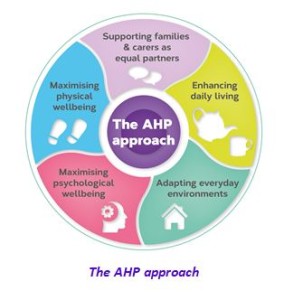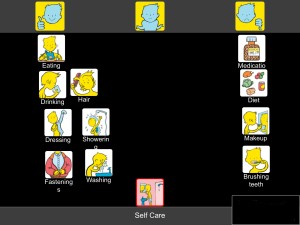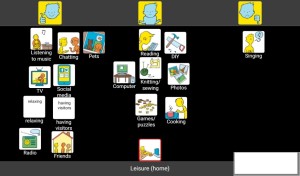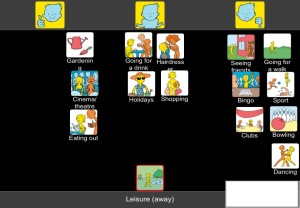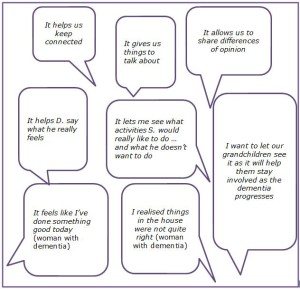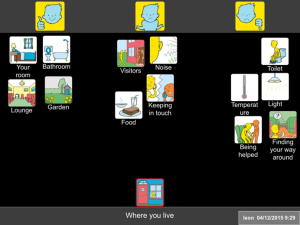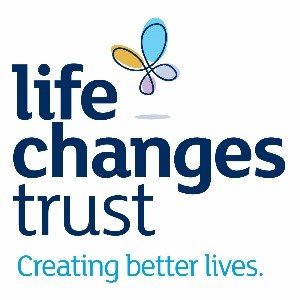Many thanks to Elaine Hunter, National Allied Health Professions Consultant with Alzheimer Scotland for this blog
Background
Connecting People, Connecting Support is a new policy document in Scotland and shares how allied health professionals (AHPs) in Scotland can support people with dementia, their families and carers to live positive, fulfilling and independent lives for as long as possible.
The policy document presents an evidence-informed case to support a biopsychosocial approach to practice for ALL AHPs in Scotland when working with people living with dementia – what we call the AHP approach. The fundamental understanding driving the AHP approach is that people living with dementia CAN benefit from AHP-led interventions. In this week’s blog we are sharing the AHP contribution to maximising psychological wellbeing.
Maximising Psychological Wellbeing
What do we mean by psychological wellbeing?
The central importance of finding ways to communicate (verbal and non-verbal) that work for each individual and which make meaningful connections that may have wide-ranging benefits in relation to overall wellbeing and quality of life is recognised. Psychological interventions of different intensities are reflected to promote emotional health and psychological wellbeing, with the provision of psychological interventions for depression, anxiety, and expressions of stress and distress. This element builds on established AHP psychological interventions and therapies.
Why is psychological wellbeing important?
People with most types of dementia will at times struggle to find the right words or follow a conversation.
- Communication difficulty can be exhausting for the person, families and carers
- We know that people can often find it difficult to talk about dementia and many people living with dementia experience social isolation
- Dementia can have a profound psychological impact and may be linked to feelings of anxiety and depression.
- A non-pharmacological therapeutic approach is advocated for the treatment of psychological symptoms and a person-centred stepped-care model of support.
3 ways allied health professionals CAN maximise psychological wellbeing?
1. Maintain and maximise communication
AHPs are aware that optimum communication occurs in environments that are comfortable, where a person can feel relaxed and safe, and when the AHP-led intervention is tailored and individualised. AHPs have experience in training others in conversation skills and cuing strategies, identifying key elements for effective everyday communication and supporting opportunities to practice communication strategies in a social context, helping the person to gain confidence in the interaction. Speech and language therapists can provide personalised communication advice (aimed at, for example, developing communication passports, assessing communication networks and maximising communication opportunities) that is shared with family members to facilitate their communication skills. Where language difficulties present as a primary feature of the dementia, as in primary progressive aphasia, speech and language therapists will carry out assessments to identify specific communication impairments and abilities. Their findings will contribute to the diagnosis and be used to plan therapy and strategies.
2. Psychological interventions
AHP core psychological skills are unique to each profession and vary according to their undergraduate education and postgraduate development activity. AHP interventions to maximise psychological wellbeing require excellent communication skills and the ability to integrate psychological interventions and psychological therapies into core AHP practice. A number of approaches based on the psychological understanding of dementia and its effects, including reminiscence approaches, life-story work, anxiety management, and engaging in everyday occupations and activities, will be core to AHPs’ day-to-day practice.
With additional enhanced training opportunities, psychological interventions can also become core to AHP roles and integral to a team approach to a stepped-care model of assessment and intervention. Psychological interventions include motivational interviewing, behavioural activation, mindfulness based cognitive therapy, cognitive stimulation therapy, cognitive rehabilitation and cognitive behavioural therapy. Specific psychological interventions providing individualised, formulation-led interventions in response to stress and distress in dementia, ranging from low-intensity to specialist interventions, can also be within AHP remits.
3.Psychological therapies
Psychological therapies are highly specialised psychological interventions that include the established AHP disciplines of art psychotherapy and music therapy.
Art psychotherapy creates opportunities for verbal and non-verbal communication by using art to enable people to feel connected to a sense of self, other people and the environment around them. It can support people living with dementia by reducing anxiety and increasing coping skills (Safer & Press, 2011), depending on how interested the person is in art activities, art materials and how they feel about one-to-one or group activities. Art psychotherapy can be particularly helpful for people who find it hard to express their thoughts and feelings verbally, enabling self-expression and enhancing sense of self and personhood.
Music therapy builds on people’s ability to respond to music to develop a therapeutic relationship and facilitate positive changes in emotional wellbeing and communication through engagement in live musical interactions. It has a robust evidence base as an effective, non-pharmacological intervention that can significantly improve and support the mood, alertness and engagement of people with dementia, reduce the use of medication, and help to manage and reduce agitation, isolation, depression and anxiety (Ridder et al., 2013).
These art-based therapies are particularly helpful when people find their emotions are too confusing to express verbally, when verbal communication is difficult or when words are not enough.
Supervision for the AHP professions is integral to all of the interventions.
On reflection
Thank you for taking the time to read this blog and we would like to know
- As an AHP, how do you currently support people living with dementia to maximise the persons psychological wellbeing?
- As person living with dementia, what support would you like to receive from allied health professionals to maximise your psychological wellbeing?
- As family carer, what support would you like to receive from allied health professionals to maximise your psychological wellbeing?
We look forward to hearing from you.
Email me at EHunter@Alzscot.org
References
There are references supporting this text which you will find in the original policy document and can be viewed here https://www.alzscot.org/assets/0002/7356/AHP_Report_2017_WEB.pdf with all the evidence informing the policy available at www.alzscot.org/ahp
Talking Mats were delighted to be involved in the launch of Care Opinion’s Picture Supported stories at the Life Changes Trust Gathering in Perth Scotland this week. We have been working with Care Opinion for the past two years to develop this feature. This earlier Talking Mats blog describes the development process and this recent Care Opinion blog gives some examples of the feature in use.
However, in this blog, I want to reflect on two events I went to within a short space of time; the gathering in Perth on Monday and the Royal College of Speech and Language Therapists study day the previous thursday in Stirling . It felt to me like my two worlds colliding or maybe it was just my stars aligning ! At the RCSLT study there was a session on the public perception of Speech and Language therapy and how there is still much work to do in changing the myths that are spun and repeated about what Speech and Language therapists actually do . For as John F Kennedy said in 1962 ‘ the great enemy of truth is very often not the lie but the myth , persistent, persuasive and unrealistic ´ The National Allied Health Professional children’s lead, Pauline Beirne suggested to the study day that Care Opinion is a great web site for encouraging that sharing of stories. Then, strangely when I got back into the office there was a story waiting for me in my in box all about the positive experience of a parent involved in a Hanen programme in NHS Lanarkshire which reinforced that very message.
We know people relate to stories, stories resonate and have impact, they are easy to remember . Our drive in working in partnership with Care opinion was to support more people to tell their health and care stories by increasing accessibility . It was designed with and for people with dementia through funding from Life Changes Trust but anyone can use it and they are! It is great to see the stories coming in.
Through stories let’s celebrate the good, develop and improve practice and let’s use stories to challenge myths and educate. So use Care Opinion and try out the picture supported stories to share your experiences , tell other people ,spread the word and the picture supported story feature !
We have been working with Care Opinion to develop the accessibility of their site for people with dementia through picture supported stories.We are very grateful to Life Changes Trust for funding this partnership.
What is Care opinion ?
Care Opinion is an independent third sector organisation that supports feedback on health and care services. They promote honest and meaningful conversations between users of health and care services and their provider organisations. If you want to see how Care Opinion works then take a moment to watch this excellent video
Why is our partnership important?
Both organisations believe it is important that everyone can tell the story of their experience of using health and care services. This can be hard as there can be barriers to telling a first-hand account of an experience. These barriers can include
- difficulties with expression and finding the correct words
- difficulties with memory
- difficulties with writing or typing on a computer
Care Opinion is skilled and experienced in supporting feedback through their web platform and supporting health and care improvements through responding to and sharing that information . Talking Mats is skilled and experienced at supporting people with communication difficulties including people with dementia, to express their views. Partnership working between the two organisations has enabled a fusion of ideas and learning from each other to develop and action our vision of a care opinion platform that is more accessible and relevant to more people. This is particularly important when Alzheimer’s report ‘Fix Dementia Care: Hospitals’ reports that at least 25% of hospital beds are occupied by someone with dementia ,that they stay twice as long as other people over 65 and the experience of being in hospital is recognised as being a particularly frightening and confusing time.
What have we done ?
We have created an alternative picture story space on the Care Opinion website that is adapted from the work of Talking Mats. The picture story sets were made up after thinking about the topics that arose on the care opinion website .Then we worked with our expert advisor groups which included
- people with dementia,
- their carers
- staff
Our aim was to find a structure that would be comprehensive whilst keeping thing simple and not overwhelming .After a period of consultation and trialling the sets with people with dementia and their carers we have ended up with two sets one that covers the ‘environment’ and one that covers ‘care’
Who can use this and what support will they need?
We know people with dementia have a very diverse range of needs and that people will require different levels of support to give their feedback on the care opinion site ranging from technical support, scribing, to reducing number of pictures, to pre-preparation using paper pictures. Some people with later stage dementia may find it hard to use it to give their own feedback but hopefully, the pictures will mean that they will still be involved and understand some of the things being talked about if people are submitting feedback on their behalf.
We felt important that that the picture story space is an inclusive feature available to all to use if they want to. Whilst this feature was designed for people with dementia we have already had feedback that other people are finding it helpful.
The Picture Stories and Talking Mats
Several people have asked us if this is a Talking Mat and our response is that it is inspired by our work but it is different and for that reason we call it a ‘picture supported story’ .It is different partly, for technical reasons but also because the contexts in which people choose to give feedback will be varied e.g. some will do it by themselves, some supported by family and friends. Above all we want this to be freely available and recognise that that means people will use it in a variety of different ways some of which will surprise us!
We are still developing support materials and webinars to go along with the site to help people get the most from it.
However, there will be some people particular those with more severe communication difficulties who will need increased support to access the story space. Effectiveness for this group will improve if there is some preparation work to prepare their feedback .Using the paper set combined with the principles of Talking Mats to support communication will help. It is for this type of support we recommend attending a Talking Mats foundation training so people are confident and skilled using the pictures in a Talking Mats framework.
Soft Launch
For the last month the picture story feature has been available on the site and we are starting to get a range of stories on it. I particularly like the one that was submitted by a school pupil on work experience supporting a person with dementia to share his experience of going to an inter-generational quiz at the local nursery which had been a very positive experience for all involved.
So please give the site a go, submit your stories or encourage others to use it and please tell us how you got on. Click here to start
We are now half way through our project, funded by The Health and Social Care ALLIANCE Scotland, whose overall aim is to empower people with a range of long term conditions, with and without additional communication difficulties, to self-manage their own health and well-being by using Digital Talking Mats.
Participants
We have carried out all the initial visits and 16 follow-up visits and participants are sending in their completed mats, choosing whichever topics they want from the digital Health and Well-being resource. At the time of writing this blog we have received 137 completed mats.
We have received very positive feedback with many examples of how people are using the Digital Talking Mats to self-manage.
Here are 3 examples:
One participant with learning disability has diabetes. Through using the Digital Talking Mats she has stopped buying takeaways every night and is now buying M&S ‘Balanced for You’ meals. This is a huge step forward for her as she refused to discuss healthier eating before.
A man with early onset dementia has identified that he used to enjoy singing and has decided for the first time in his life to join a choir. This is not something that had come up in conversation before. Despite the diagnosis of dementia he has realised that he is still keen to try new things.
The wife of a man with severe aphasia said ‘This (Leisure away) has highlighted how few things he can do away from home. We discussed this but can’t see how we can change the situation.’ However at the second visit he used the same mat and indicated that he had been thinking about his mobility and was about to start swimming and a fitness class.
We already have an increased awareness of the meaning of self-management as we observe how participants are using the Digital Talking Mats to think about their situation, state their own views and share them with carers/support workers. We are also noticing that there is a shift in some relationships as the carers/support workers realise that the person with the long term conditions can make decisions and express their own views rather than having decisions made for them.
We are very grateful to Mary Walsh, Senior Speech and Language Therapist at St Mary’s Hospital in Dublin, for her Blog ;Does he like fairy cakes? ‘ It has been taken from her report on a project which looked at how speech and language therapists can facilitate the involvement of people with dementia to become more active participants in the decision making process around dysphagia management at the end stage of dementia. The project was funded by the Irish Hospice Foundation Changing Minds Programme
The project aims were:
- To improve person centred care in relation to residents’ food and drink preferences and dislikes
- To actively involve the residents of the dementia specific unit in the decision making process around their dysphagia (swallowing) management particularly at the end stage of their lives.
In order to find out the food and drink preferences and dislikes of the residents, the team carried out staff questionnaires and family questionnaires. They found that, although these were useful in getting a quick overview, there were a lot of unanswered questions.
The team also used Talking Mats and found it to be a powerful way to explore the residents’ food and drinks preferences and dislikes when used with suitable candidates. Participants appeared to really enjoy the experience including looking at pictures of the completed mats afterwards. This may be because they felt heard, that their views mattered and/or that they felt empowered. The information was important for current Dysphagia management, and also as an advanced directive in the documented evidence of the residents’ wishes in the recorded pictures of completed mats.
Brief Case Study: Does he like fairy cakes?
Talking Mats was used with a gentleman who may have been assumed to be unsuitable to use Talking Mats as he was assessed as having late stage dementia. However, this man engaged readily in the Talking Mats interview and appeared to be happy to have his views recorded. Also, there was a much higher level of correlation than variance with Talking Mats and both the staff questionnaire and the family questionnaire thus further indicating that he was a suitable candidate. ‘Fairy cakes’ was something that this resident reportedly liked in both the staff questionnaire and the family questionnaire. However, the gentleman indicated twice on Talking Mats that he disliked fairy cakes.
A number of actions are proposed in the report including :
- Continue to use Talking Mats as appropriate in the dementia specific residential unit and the rehabilitation wards of St. Mary’s Hospital.
- Inform the multi-disciplinary team of the merits of Talking Mats. This tool can also be used to explore other important issues for suitable residents/ patients on a case by case basis.
Conclusion:
It is essential to challenge our assumptions in our dealings with people with dementia. Truly person centred care takes time and patience where assumptions are challenged. Also, it is essential to listen to what residents tell us verbally, or through a supported communication system such as Talking Mats or non-verbally through tone of voice, facial expressions or gestures, and to act according to what is being communicated.
To read the full report please contact Mary Walsh at mary.walsh6@hse.ie To find out more about a Talking Mats resource that specifically focuses on finding out views on eating and drinking then please click here
Delighted to introduce you to ‘The Communication Game’ : a board game for staff to improve their communication skills.
How we listen, talk and engage with people is fundamental to the quality and effectiveness of health and social care services. Although communication underpins everything we do in a work context, it can be a difficult topic for staff to talk easily about. Add to that the possibility of service users having an additional communication support need, through reasons like stroke, learning disability or dementia, then there is much potential for things to go awry and unfortunately, they often do. ‘Poor communication’ is cited as the most common cause of frustration in complaints about services.
The Communication Game was developed by Focus Games, NHS Education for Scotland (NES) and Talking Mats. It is a learning tool to help staff working in the health & social care sector increase their knowledge and skills around communication. The Communication Game is fun and easy to play. It can be played with or without a facilitator, and allows staff groups to have discussions and reflect on their communication skills. It allows them the chance to learn from each other. It will improve knowledge, but more importantly enable them to think about the small steps they can make to improve their interactions.
The project grew out of two previous projects funded by NES: Making Communication Even Better and Through a Different Door. In these projects, it was recognised that the experience of services for people with a communication support need is something of a lottery. For them, there was a considerable difference in the experience of interacting with a staff member who was empathetic and able adapt to their communication, to interacting with a member of staff who was struggling and unable to adapt their interaction. Training and understanding of inclusive communication practice is key. It has been a great privilege for Talking Mats to continue to support the work of the previous 2 projects and work with Focus Games Ltd to develop The Communication Game. Support during the development process from the Stroke Association Scotland, Capability Scotland, RCSLT, Scottish Care, Communication Forum, Queen Margaret University and NHS Ayrshire & Arran SLT Department have been invaluable, and we are very grateful; also to NHS Education for Scotland for their continued input and funding.
If you are working with staff in the health and social care sector, then this will be a great resource for you. You can get The Communication Game from the Focus Games online shop. It is guaranteed to promote laughter learning, and a touch of competitive team spirit. Most importantly, it will be a catalyst to help develop staff communication, making interactions better for people with communication support needs.
You can find out more about the game at www.communicationgame.co.uk
, and follow the game on Twitter on @Comm_Game.
Get your copy at www.focusgames.com.
This blog summarises a project we have completed providing Talking Mats training for families living with dementia. A key aspect of the work done by Talking Mats is to find ways to improve communication for families living with long term conditions. In particular dementia is a long term condition where deterioration in communication will eventually affect everyone. This makes it increasingly difficult to ensure that the person with dementia continues to be involved in decisions about their life.
We have completed a project funded by Health and Social Care ALLIANCE Scotland. Training in the use of Talking Mats was given to families living with dementia and staff who worked with these families. The Alliance Family Training final report highlights how this training helped people with dementia to communicate their views and be more involved in making decisions about their lives.
Families identified issues relating to self-management that they had not previously been aware of and new insights emerged as the following comments illustrate.(click on box to enlarge)
For some family members an important outcome was that Talking Mats helped them see that their spouse was satisfied with many aspects of his/her life. They found this very reassuring as many assumed that the person with dementia was frustrated and discontented.
The following is an example of how using Talking Mats helped with self-management.
When using Talking Mats on the topic of Where you live, G explained that he found it difficult to find his way to the toilet in the night. As a result his wife bought special senior night lights to help him which solved their problem. As a result, night times improved for both of them.
For further examples and information read the full report here Alliance Family Training final report and for further information about Talking Mats Family training please contact info@talkingmats.com
Talking Mats considers both health and social aspects when it is used to include people in their care planning. Lots of interesting comments are made by course participants on the forum in our online training course. Annemarie, who works as an agency carer visiting clients in their own homes posted her thoughts about the social model of disability
Remembering the person behind the condition
In my experience, society is fixated on the medical model, the ‘what’s wrong’ approach. Whilst the medical model is clearly a valuable and required tool, it often leads to labels that individuals are then lumbered with, such as, ‘she has dementia’, ‘she is visually impaired’, ‘he’s deaf’ or has a ‘leaning disability’. Taking this approach overlooks the person behind the ‘condition’ and so can restrict inclusion. One example could be an individual with dementia being unable to make everyday choices about seemingly mundane issues such as what to wear that day. Using a medical model, a carer may be aware of the clients difficulties and make choices for them, whereas using the social model approach enables the carer to see beyond the condition and fully include the client, allowing them to be part of the decision making process for themselves. A second example could be a person with a communication disorder such as Asperger’s Syndrome. Access to work could be severely restricted using a medical model as the pragmatic manifestation of this condition may well exclude a person from seeking certain types of employment. Promoting the use of a social model would ensure work colleagues understood the possible limitations of the condition and ensure adequate support networks were in place. The social model attempts to embrace a person’s difference and raises awareness within society of individual needs that will facilitate inclusion into all aspects of life.
The WHO ICF -World Health Organisation International Classification Framework of Functioning, Disability and Health (2001, 2007b) aims to merge the medical and social model, encouraging professionals to think not only of the persons health condition and resulting impairment, but the impact this has on the persons participation and activities. It captures the full complexity of people’s lives, including environmental and social factors and can be applied over different cultures
The Talking Mats Health and Well- being resource is based on the WHO ICF and supports a person to reflect and express their view on various aspects of their lives. Using the Health and Well being resource supports workers to remember the person behind the condition.
We are delighted to have received funding from Life Changes Trust to work with Patient Opinion to help improve the access to their website by developing a Talking Mats to enable people to tell their stories.
Like Talking Mats, Patient Opinion is a Social Enterprise and has an excellent independent website https://www.patientopinion.org.uk/ that enables people to share their experiences of UK health services, good or bad. They then pass the stories to the right people so that they can learn from them.
The project we are working on is focusing on people with dementia but in the long run we hope that lots of people will benefit. It will bring our two innovative technologies together marrying the expertise of the Patient Opinion website with that of the Digital Talking Mats.
Our aim is that people affected by dementia can use their own voice to share their experiences and make real differences to relationships, services and culture, just as many others are already doing across health and care. We also hope that this work will empower others with communication or cognitive difficulties to share their experiences and be heard in an open and transparent way.
This ground breaking work is being funded and supported by Life Changes Trust, People Affected by Dementia programme. The Big Lottery funded programme is committed to working with people living with dementia and those who care for them, investing resources so that individuals are more able to face the challenges before them, and can exercise more choice and control in their own lives.
We expect the project to take 18 months to complete and have already run focus groups with people with dementia, family members and expert practitioners to plan the new symbols. We are now working with the technical experts to create the website interface which we will then pilot with people with dementia.
Watch this space for more updates…..
What are the top 10 blogs for using Talking Mats with adults? Over the years we have posted lots of blogs on different aspects of our framework . If you are working with adults with communication disability these blogs maybe particularly helpful
- Where is the best place to start using the Talking Mats health and well-being resource?
- A blog from Denmark which highlights the effectiveness of using Talking Mats with people with dementia
- Goal setting with a woman with Multiple sclerosis
- Using the app with someone with aphasia
- The development of a resource to help people with learning disability raise concerns
- How can Talking Mats support Capacity to make decisions
- Involving people in their decisions about eating and drinking
- Thoughts on using Talking Mats with people with dementia to explore mealtimes
- Using Talking Mats with someone with a learning disability and dementia
- Use in a rehab setting in South Africa
If you want to explore our resource and training more please visit our shop
 Online training login
Online training login 

